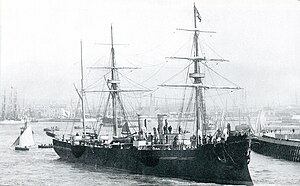Japanese cruiser Unebi

Unebi departing Le Havre, France 1886
|
|
| History | |
|---|---|
|
|
|
| Name: | Unebi |
| Ordered: | 1883 Fiscal Year |
| Builder: | Forges et Chantiers de la Gironde, France |
| Laid down: | 17 May 1884 |
| Launched: | 6 April 1886 |
| Completed: | October 1886 |
| Struck: | 19 October 1887 |
| Fate: | Disappeared December 1886 |
| General characteristics | |
| Type: | Protected cruiser |
| Displacement: | 3,615 long tons (3,673 t) |
| Length: | 98 m (321 ft 6 in) w/l |
| Beam: | 13.1 m (43 ft 0 in) |
| Draught: | 5.72 m (18 ft 9 in) |
| Propulsion: | 2-shaft VTE, 9 boilers, 5,500 hp (4,100 kW), 700 tons coal |
| Speed: | 18.5 knots (21.3 mph; 34.3 km/h) |
| Complement: | 280-400 |
| Armament: |
|
| Armour: |
|
Unebi (畝傍?) was a protected cruiser of the Imperial Japanese Navy, designed and built in France by Forges et Chantiers de la Gironde. Unebi was named after Mount Unebi in Nara prefecture, located near the ancient capital of Asuka. Per Meiji period State Shinto mythology, this mountain was home to Japan's first Emperor, Jimmu Tenno.
During the period of increasing tension with the Empire of China prior to the First Sino-Japanese War, the development of the protected cruiser was of great interest to Japan because of its high speed, powerful armament, armour protection and relatively low cost, especially since the Imperial Japanese Navy lacked the resources at the time to purchase modern pre-dreadnought battleships necessary to counter the Chinese Beiyang Fleet. During the tenure of Naval Minister Kawamura Sumiyoshi, three vessels were ordered: Naniwa and Takachiho from the Armstrong Whitworth shipyards in England, and (for political purposes), Unebi from the Forges et Chantiers de la Gironde yards of France.
...
Wikipedia
